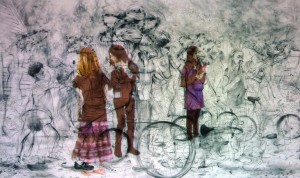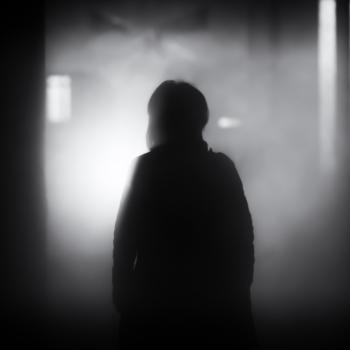 Let the words find you, you who have been hiding from them for so long.
Let the words find you, you who have been hiding from them for so long.
That’s what I heard, that sentence.
Hear, O Israel: maybe because I’ve said those three words, Hear, O Israel, for as long as I can remember, I listened.
Maybe I was in the shower. Maybe I had just finished listening to a story on Weekend Edition, and I was turning, turning away, turning my attention but my attention hadn’t arrived at what it was seeking, hadn’t landed on what it would rest next. That’s when, in transition, I heard, Let the words find you, you who have been hiding from them for so long.
When I heard the words, I knew to write them down. I knew I would see if they would lead me to my next essay for “Good Letters.” As it turns out, they did. But not without frustrating me when, after a few lively and surprising exchanges between the voice that spoke the initial sentence and “my voice,” that first voice stopped speaking—stopped, I sensed, before our conversation had ended.
Stubborn, determined, impatient, I put words in its mouth. But when I did, I had nothing to say in return.
Finally, humbled, I waited and listened to the silence. Then, in its own words and, as it turns out, in its own good time, it spoke again.
Hear, O Israel. I’m listening. Where are you? Here I am.
And here, yes, here, is our conversation:
Let the words find you, you who have been hiding from them for so long.
Which words?
The words carried by the current of a river whose source is unknown—unknown, though many have sought it.
The river’s source may be hidden, but I am not. I am right here. Within range of a Jambox from which I hear an author reflecting on deadlines, illness, divorce. Her words find me shaving, showering, dressing for a cold day. Are these the words?
Fresh Air. Listening to a podcast of yesterday’s interview while you prepare for this day is one way to hide.
I hide from people, not voices. I have always tried to hide from people, behind a closed door, under a table. Even standing in a room full of people, conducting a discussion as if it were a symphony—surge of brass, bass, and kettle drum followed by willowy flute—or a minimalist pulse electronic, I am hiding. My disclosure is what they disclose: lively students, colleagues and friends, congregants who have all but ceased from creating neural pathways.
You hide in the voices of others.
Who are you?
I know your father, both of your fathers, Pharaoh and Joseph. I know your birth father, the one who spoke once before your memory was born and then was never heard again, and I know your flag father, the one who gave you a nation in (from) which to hide.
A nation, thus: an unbreachable wall to build.
It will be breached, just like the walls that secured your temple, the walls that enclosed the empty holiness of holiness.
Who are you?
I am unpublished, unsanctified, unborn. I meet none of your criteria for authority. Yet, I call you forth and you respond. I hold your attention.
I want to hide
from my body
but when I do
not answer
D’s call (caller ID)
my body doesn’t
answer the call,
when I close
the door to my
study so I can work
my body closes
the door to my study
and thinks whatever
I’m thinking, trying to
come up with a way
to solve the problem
of my body.
Every solution
I entertain, my body
entertains. We’re
inseparable, it seems.
I can’t even love
my wife in private,
I can’t love her
without my body,
the parts of my
body from which
I’d like to hide.
The body is a special case. To be remembered, and kept.
I know trouble
when I would be at ease
Word to word:
an infectious disease
or sanctuary: the book of praise, the book of pleas
I know the book of pleas, I know the book of praise, pages I turn and distractedly turn unless a word darts from the page to
your heart, where it hides among (from) the other worshippers
yes, and I would linger there, letting the clock self-erase, but around me worshippers keep tuning and fine tuning the service, leaning toward lunch or seeking the exact frequency at which angels—
The book’s too heavy to take flight. Its thousand wings do not suffice to lift and power it on its way.
How did you find me?
I never lost you. I have been with you all along.
Who are you?
I am the Voice of myriad voices.
You hide in others’ voices?
Live, not hide. If not in others’ voices, how could you hear me?
Are you dead or alive?
Alive. I live. As long as you can hear me, I live. But I cannot speak for you.
Richard Chess is the author of three books of poetry, Tekiah, Chair in the Desert, and Third Temple. Poems of his have appeared in Telling and Remembering: A Century of American Jewish Poetry, Bearing the Mystery: Twenty Years of IMAGE, and Best Spiritual Writing 2005. He is the Roy Carroll Professor of Honors Arts and Sciences at the University of North Carolina at Asheville. He is also the director of UNC Asheville’s Center for Jewish Studies.










